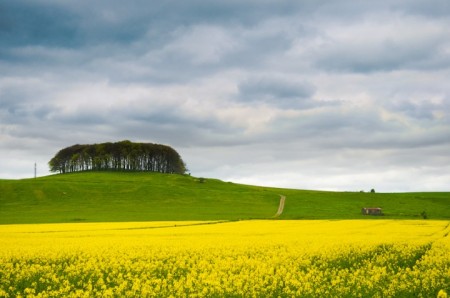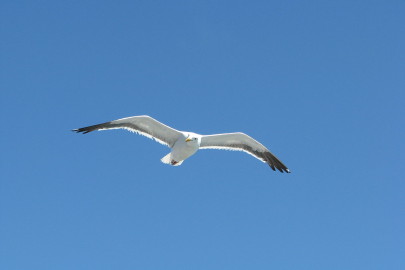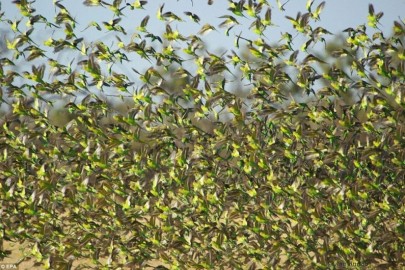The unsettled weather of the last few days – the British weatherman’s ‘sunny spells’ interspersed with the same’s ‘thundery showers’ – brings to mind a poem by Louis MacNeice, June Thunder. It was published in 1938, and it’s difficult to read it now without thinking of it as pre-war, a foreshadowing of larger storms. It is, though, sufficient in itself, even if I do think it’s more convincing as an ebulliently Romantic description of an atmosphere than as a frame for romantic yearning.
It has startlingly vivid imagery, as well as a slight awkwardness, what with its rather clotted, alliterative rhythms and the ungainly words that occasionally hold you up. But that seems to me just right for evoking those strangely beautiful moments when sunshine and dark clouds heighten colour and sound, and the world seems to hold its breath.
June Thunder
The Junes were free and full, driving through tiny
Roads, the mudguards brushing the cowparsley,
Through fields of mustard and under boldly embattled
Mays and chestnuts
Or between beeches verdurous and voluptuous
Or where broom and gorse beflagged the chalkland–
All the flare and gusto of the unenduring
Joys of a season
Now returned but I note as more appropriate
To the maturer mood impending thunder
With an indigo sky and the garden hushed except for
The treetops moving.
Then the curtains in my room blow suddenly inward,
The shrubbery rustles, birds fly heavily homeward,
The white flowers fade to nothing on the trees and rain comes
Down like a dropscene.
Now there comes catharsis, the cleansing downpour
Breaking the blossoms of our overdated fancies
Our old sentimentality and whimsicality
Loves of the morning.
Blackness at half-past eight, the night’s precursor,
Clouds like falling masonry and lightning’s lavish
Annunciation, the sword of the mad archangel
Flashed from the scabbard.
If only you would come and dare the crystal
Rampart of the rain and the bottomless moat of thunder,
If only now you would come I should be happy
Now if now only.












Really nice poem, and one I haven’t come across before.
Interesting if unanswerable question, whether this is really a love poem, a foreboding of the “larger storms” of war and politics, or a simple evocation of “atmosphere” (in the most literal and meteorological sense). Hundreds of poems in the English canon seem to beg the same set of questions.
There’s a view, of course, that every literary work, however seemingly apolitical, speaks of the social and material conditions that produced it, and on some level reflects on the political events of its own day and ours. I once read an essay of Tom Paulin’s, in which he goes to great and ingenious lengths to show that Keats’s ‘To Autumn’ is really about the Peterloo Massacre. After many years of reading the stuff, I think I’m slowly coming to the opposite conclusion — that all English poetry, whatever its ostensible subject, is really about the weather. Yes, from ‘Westron wind when wilt thou blow’ and ‘In a somer sesoun whan softe was the sonne’ and ‘Whan Aprille with its shoures soote’ to the good bits of Coleridge and Keats and Shelley and Tennyson and Hardy and Eliot (“April is the cruellest month”, “Midwinter spring is its own season”), it’s not about love or politics or religion — these are the merest excuses for writing — it’s all just a bunch of people making conversation about the weather,
Comment of the month so far, I reckon…
Jonathan, you expressed much better than I could exactly what I was driving at in the last sentence of the first para. As you say, you could attach to the tension and excitement of the summer storm any number of unsettling situations, writ large and small. However, what attracts me to this poem is the precise but imaginative expression of the experience of that particular sort of weather.
I now wonder whether this is because a ‘conversation about the weather’ in English poetry is a vehicle for communicating what it feels like to be alive. George Mikes reckoned ‘the English have no soul, they have the understatement instead’ – perhaps to be found not least in their poetic interest in weather?
I agree, the awkardness works, Gaw – you can feel the tension, if not the electricity. Reminds me of the time I was sitting under a tree at Granchester on the day of Princess Diana’s funeral. I’d wanted to get away from it all, but hadn’t anticipated a curiously theatening turn in the weather. Perhaps it was a reflection of our communal mood?